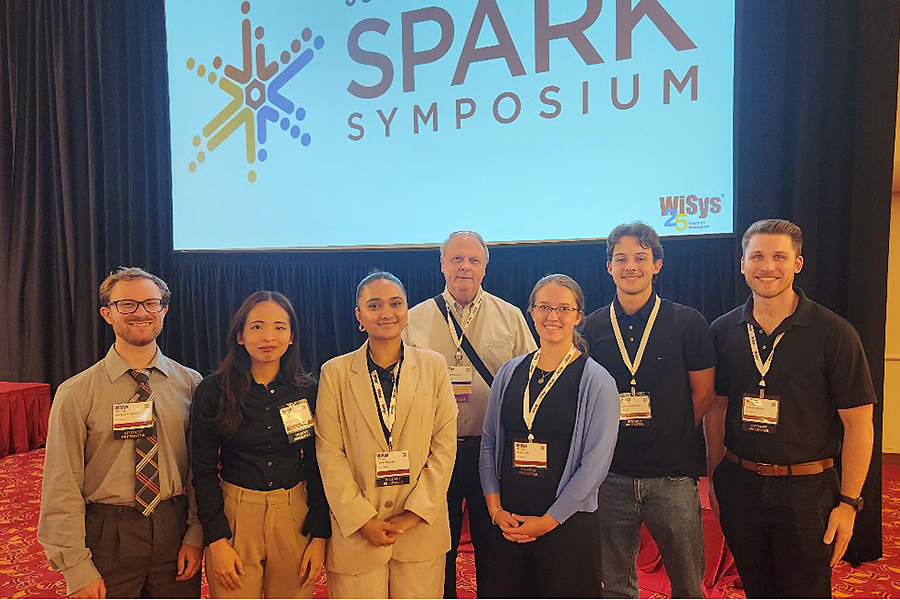TYPE
For many college students, summer is a chance to take a break from their studies. While there’s certainly value in rest and relaxation, several University of Wisconsin–Superior students used the time to dive deeper into research – joining peers from across the Universities of Wisconsin at the annual WiSys SPARK Symposium.
Bringing together research, innovation and entrepreneurship, the symposium is a celebration of ideas and collaboration. Held July 23–25 at the Monona Terrace Community and Convention Center in Madison, Wisconsin, the event provided opportunities for networking, faculty presentations, student research poster sessions and innovative project showcases. Participants included faculty, staff, students and alumni from across the Universities of Wisconsin system.
Among the six UW-Superior student attendees was Ponika Bhandari, who was accompanied by Professor Sergei Bezroukov.
A senior from Kathmandu, Nepal, Bhandari is a pre-medicine major with minors in chemistry and behavioral neuroscience. She first learned about the WiSys SPARK Symposium while participating in UW-Superior’s Summer Undergraduate Research Program (SURP) last year. This program allows undergraduates to spend the summer working on a research or scholarly project under the guidance of a faculty or staff mentor.
“I’m incredibly thankful for the opportunities UWS has provided me,” said Bhandari.
This summer, her dedication to research culminated in a poster presentation titled “Characterization of Particles from HEPA Filters from the International Space Station.”
“My project involved analyzing the composition and potential implications of particles collected from HEPA filters used aboard the ISS,” explained Bhandari. “It offers insight into both the chemical and biological risks associated with long-term space travel.”
For Bhandari, the project aligned with a lifelong passion.
“I’ve had a deep interest in space science since I was young, which was further nurtured when I completed a School of Astronomy program in Nepal,” she said. “Even though I’m pursuing pre-medicine, I’ve always been fascinated by the intersections of space, science, and human health.”
“This project was a unique opportunity to merge my interests into one meaningful study. Exploring how particles in space environments could impact health allowed me to combine different areas of science in a personal and academically fulfilling way. It also made me think about the future of space medicine and astronaut health – an exciting and growing field.”
Throughout her research, Bhandari was mentored by Professor Lorena Rios Mendoza, a world-renowned expert in microplastics research and environmental chemistry.
“Her expertise in environmental chemistry and microplastic pollution was invaluable throughout the research process,” said Bhandari.
At the symposium, Bhandari found herself inspired by the vibrant community of student researchers and the opportunity to present her work to a wider audience.
“I really enjoyed sharing my work and learning how to articulate complex ideas in an engaging and accessible way,” she said. “I was inspired by the diversity of projects and perspectives from other students. Every conversation and presentation reminded me of the power of curiosity and innovation. It was an honor to represent UWS and be part of a space that celebrates academic exploration and creativity.”
